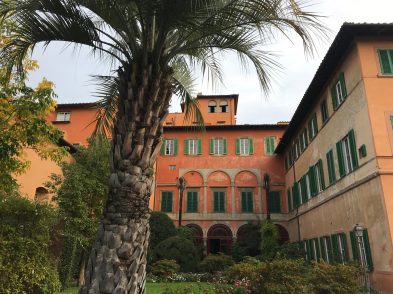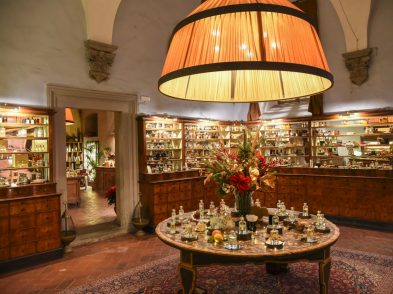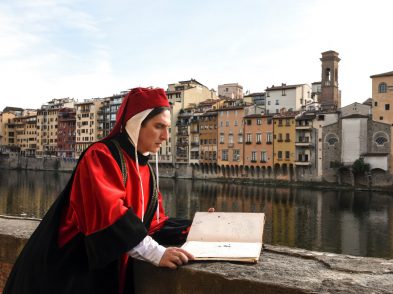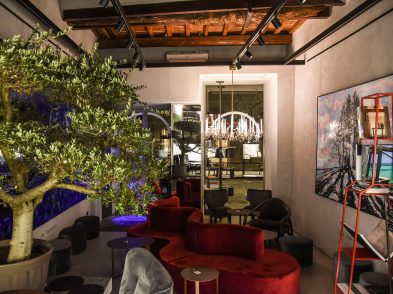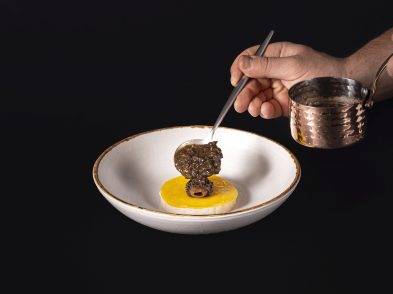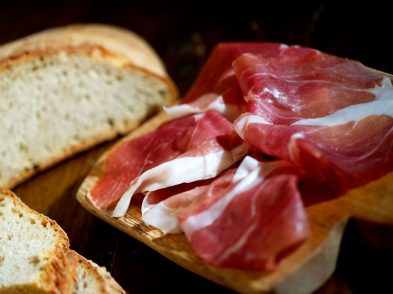On a table at Sor Tino, a perfectly Tuscan restaurant in chic Brentwood Los Angeles, is a bottle of Tuscan wine with a curiously personal Anglo name, “Philip”, and a colorful image of what appears to be an eighteenth-century man. The diners at the table are the Fiumi family, Florentines by birth and, at the time, residents of Los Angeles. They are gathered for the “immigrants’ dinner”, a tradition started by Morgan Fiumi, the young patriarch. Morgan’s late father, Fabrizio Fiumi, and his American mother, Terry, founded the Florence Film Festival years ago, the first in Italy to showcase American independent films. A family still in the film business with forays into medicine, community service and more, the Fiumis are wholly American and entirely Tuscan at the same time. Little did anyone at the dinner that evening realize that the bottle of wine on the table, this unusual “Philip,” had a more powerful link to the two Fiumi homes than could be imagined.
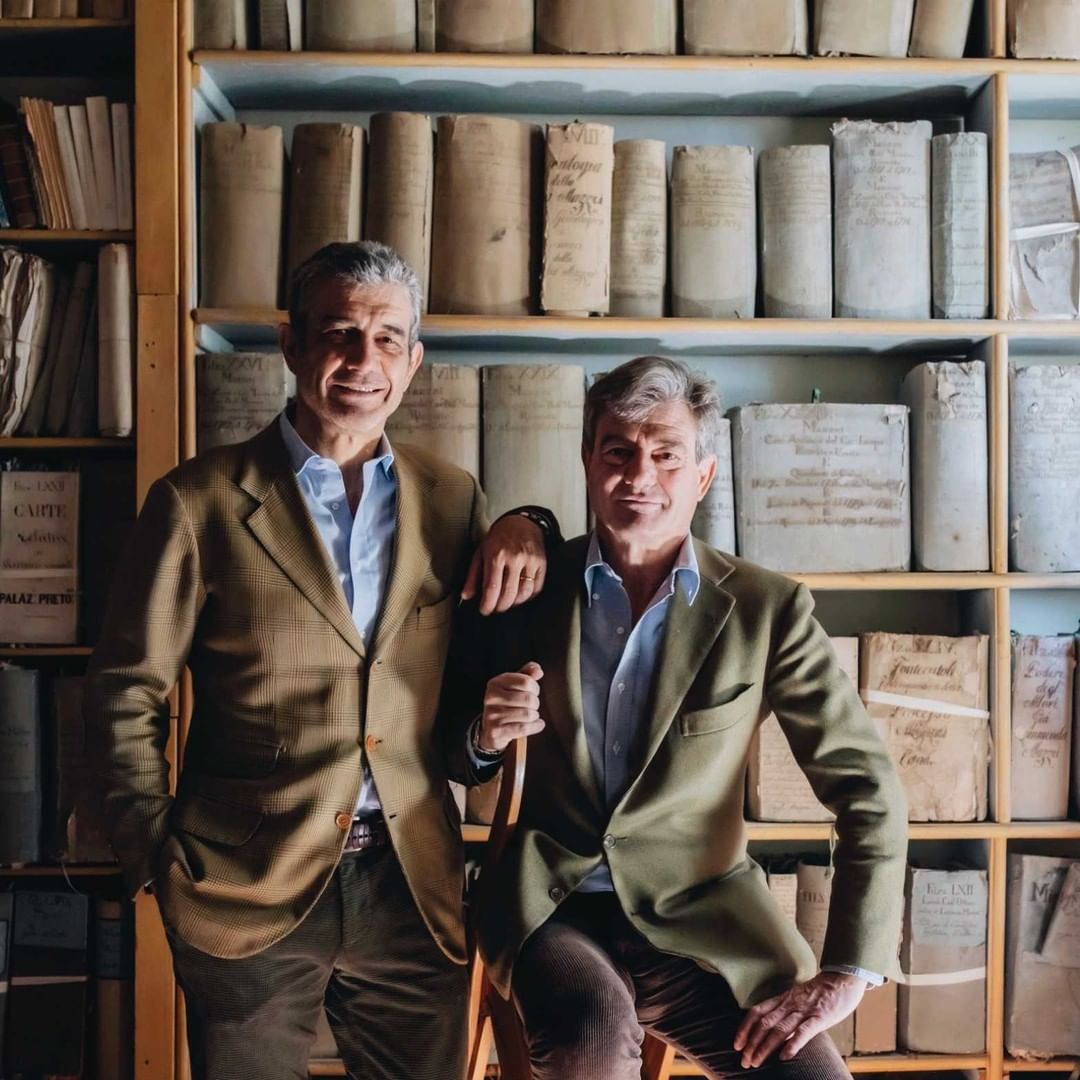
Brothers Francesco and Filippo Mazzei
“Philip” is produced by a winery in Chianti, Tuscany, at the Fonterutoli estate owned by the Mazzei family and today operated by brothers Francesco and Filippo Mazzei: Francesco resembles Rudolph Valentino had he lived beyond his thirties and Filippo has a semblance of Marcello Mastroianni. Their sister, Agnese, strikes as a Sophia Loren, had she taken up the business of architecture, which Agnese successfully has. Their ancestor, Ser Lapo Mazzei, is known as the author of the first document written in 1398 to use the Chianti wine denomination. Six hundred years ago, Lapo Mazzei’s granddaughter, Madonna Smeralda Mazzei, married Piero di Agnolo da Fonterutoli, and so the Fonterutoli estate has been in the Mazzei family ever since. But 300 and some years after the Mazzei-Fonterutoli union, a friendship was formed that has bonded Tuscany and the United States in meaningful ways.
Filippo Mazzei, Filippo and Francesco Mazzei’s ancestor, was born in Tuscany in 1730. He was a physician, winemaker and arms dealer. After having studied and practiced medicine in Italy and the Middle East, he made his way to London to work in the mercantile trade. While there, he encountered George Washington and Thomas Jefferson. He spoke to them about bringing some of his family’s Tuscan traditions—wine and olive trees—to the New World. The men from the other side of the sea thought this was a good idea, and so in September 1773, Mazzei boarded a ship with vines, seeds, plants and farmers from Lucca. Eventually, Mazzei and Jefferson became good friends and Jefferson gave Mazzei a significant amount of land on his Monticello estate to see through production. Mazzei was already known for his outlook on civil liberty, having written about all men being created equal. It is interesting to ponder this outlook given his residency at Jefferson’s estates, knowing what we do now about the 600 slaves that were indentured to Jefferson. What we do know, however, is that Mazzei and Jefferson exchanged ideas about freedoms and liberties. Historically, it is recognized that Filippo Mazzei infused Jefferson with the idea that “all men are created equal”. It might seem the obvious ethic to strive for in our time, but this was an entirely different idea in a world ruled by kings, queens and despots, all with “divine rights”.
Several years later, Mazzei returned to Tuscany and ended up acting as a secret agent to Virginia, supplying arms for the Revolutionary War. He travelled Europe, promoting the new American ideals and published a book in Paris about the American Revolution, while becoming an unofficial de facto ambassador of the United States in Europe. The family heirloom, Fonterutoli continued to produce Chianti of the highest order. Twenty-four generations later, production has expanded beyond Tuscany, as far south as Sicily, and the wines are loved throughout the world. But visiting Fonterutoli, the heart of the Mazzei winery is special in and of itself.
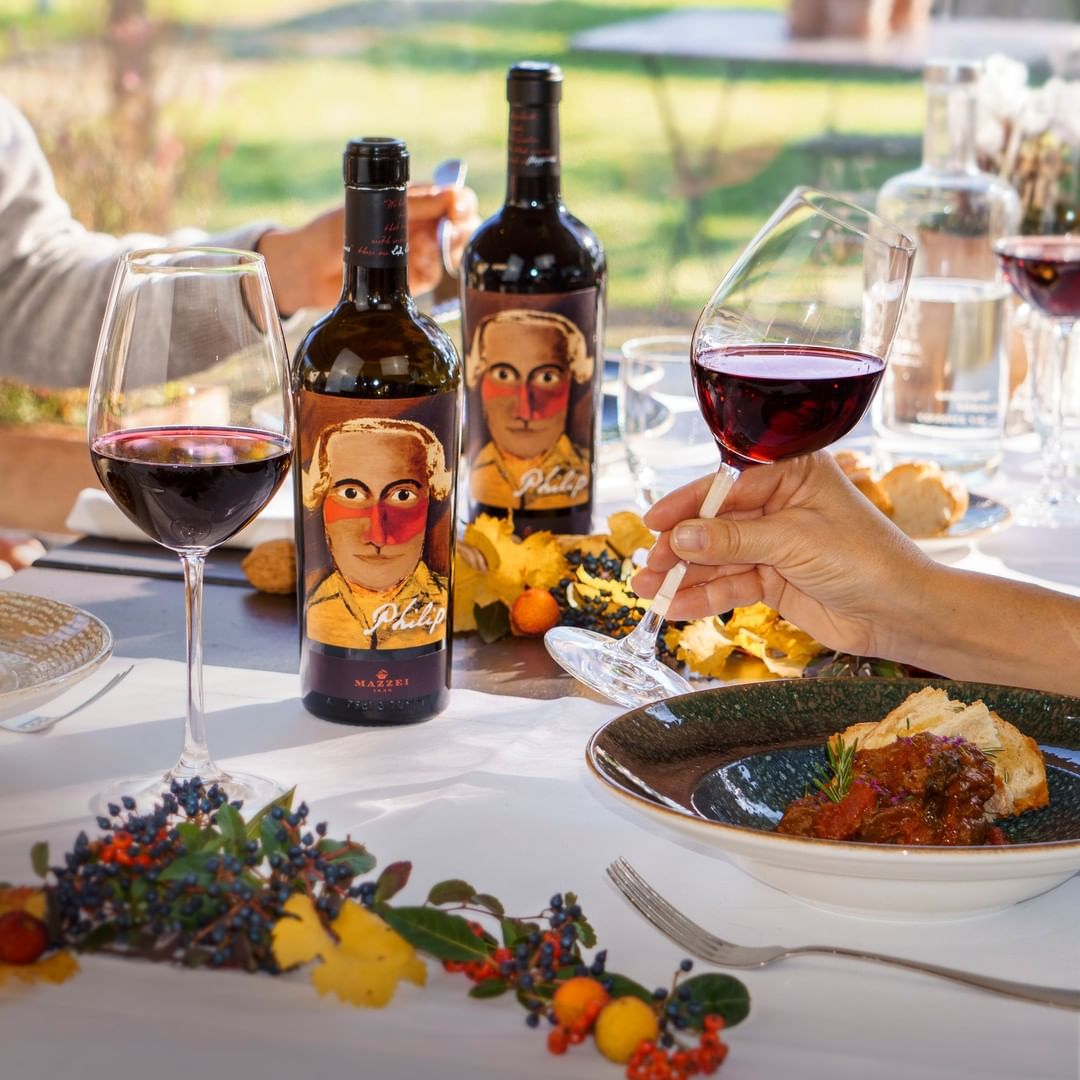
“Philip” wine by Mazzei
Nestled in Chianti’s rolling hills, the main roads are lined with vines. On driving through them, one almost feels an intruder in nature’s territory. Perfectly tailored rows line the hillsides as far as the eye can see. The entrance to Castello di Fonterutoli is elegant and ancient. It is also humble as it is with true history that has no need for showing off, much like the Mazzei family is today. Behind the perfectly appointed wine shop in the centuries-old stone entrance is a little borgo, a village that tells the story of 600 years of winemaking. In the chapel, peace treaties were signed between Florence and Siena in the early thirteenth century. Outside, one glimpses Siena and its Duomo, which stand as if in protection of the wine. The hamlet consists of a handful of houses used as guest suites for wine lovers. The osteria features world-class cookery centered on fresh local produce in inventive and delicate ways, while the wine tasting experience is a treat for aficionados. The idea that the American ideal that all are created equal was born on these hills is very moving.
Brothers Francesco and Filippo welcomed me with warmth and generosity. Immediately, I’m taken into the fifteenth-century villa where one can find grandmother’s boudoir, great-grandmother’s dining table, great-great-great grandmother’s linens, as well as paintings of uncles, aunts, brothers and sisters going back six centuries. And then there is the records’ library. The Mazzei brothers take out a folio, open it and say, “Here are Machiavelli’s wine orders from the early 1500s”. They show me more. Dumbfounded and mesmerized, I ask about Thomas Jefferson. Filippo tells me that the wine business in Monticello didn’t really go over. I think about who would have been forced to till the soil and do all the work. As the brothers talk and share, I become acutely aware of character and wonder what influences character and thinking. Where did Filippo Mazzei the elder’s ideology of people being created equal come from? Was the thinking a product of the environment? Did his mother treat the house staff with respect and gratitude because she, like these brothers, were humble? It’s hard to know, but one feels it deeply in these hills. In his “We are a nation of immigrants” speech, John F. Kennedy referred to Filippo Mazzei as the originator of “all men are created equal” and a great influence on Jefferson’s Declaration of Independence. In 1980, a United States stamp was created in Mazzei’s honor and, later still, President Obama referred to Mazzei in one of his speeches.
All this makes me think about my own relationship to Tuscany, a place where I have chosen to work and call home. I think about my life in the United States as a bit of a musical troubadour, encountering people from all over the world who have either been born into the American ethic or who have come to live in America because of the ethic and opportunity it offers. I think about my friend Morgan Fiumi and his beautiful family at their “immigrants’ dinner” at a Tuscan restaurant in Brentwood, California, drinking wine from a bottle whose namesake I now stand with in his centuries-old library, and I realize how bound we are by our ethics, but also by our love of just wanting to make the world that little bit better.


